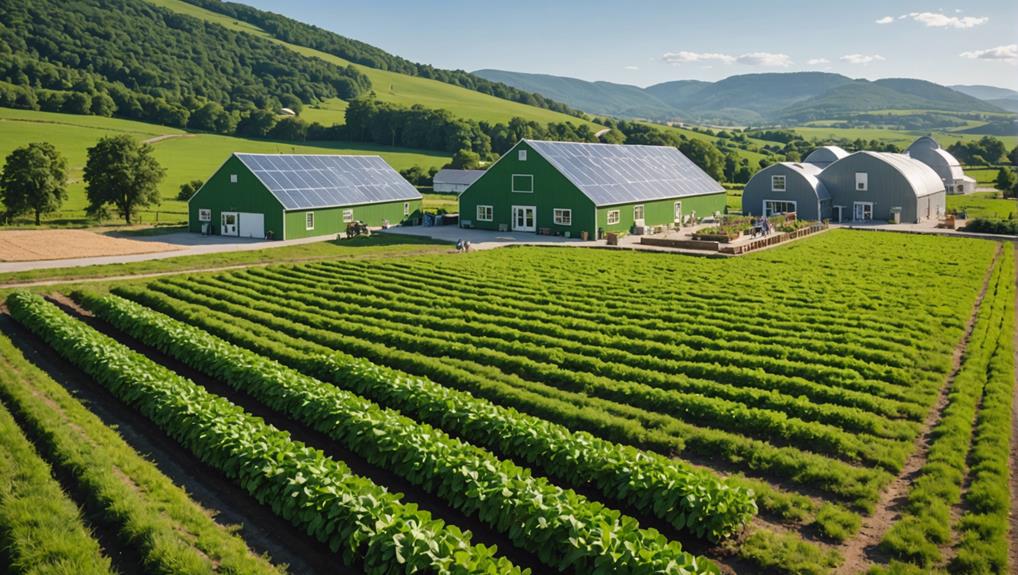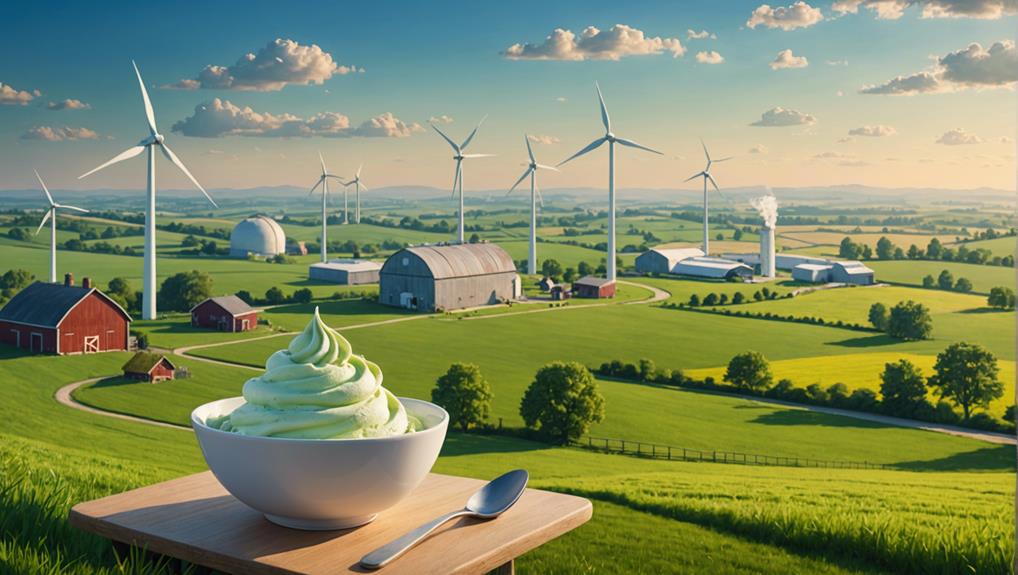Moreover, extensive, notably
Vegan frozen yogurt is an environmentally sustainable option due to its reliance on plant-based ingredients such as almond and coconut milk, which require notably less water and land compared to dairy. The production of vegan yogurt also generates fewer greenhouse gas emissions and uses less energy, enhancing resource efficiency. Moreover, sustainable practices like organic farming contribute to soil preservation and biodiversity. Companies like COYO and Green Business Certified brands emphasize eco-friendly methods, while homemade recipes can minimize packaging waste. For an extensive understanding of its environmental advantages, various aspects warrant further exploration.
Key Takeaways
- Vegan frozen yogurt production uses significantly less water and land compared to dairy-based yogurt.
- Plant-based ingredients in vegan frozen yogurt generate fewer greenhouse gas emissions than dairy.
- Almond and oat-based yogurts require substantially less water than traditional dairy yogurt.
- Homemade vegan frozen yogurt reduces single-use packaging and supports sustainable eating habits.
- Local sourcing and optimized logistics for ingredients can lower the transportation carbon footprint.
What Is Vegan Frozen Yogurt?

What exactly constitutes vegan frozen yogurt, and how does it differentiate itself from traditional dairy-based options? Vegan frozen yogurt is a type of plant-based frozen dessert that eschews all animal-derived products, including milk and yogurt cultures. Instead of using dairy, this alternative utilizes plant-based milk such as almond milk, coconut milk, or soy milk as its foundational ingredient. The absence of animal products inherently makes it a dairy-free frozen option, catering to individuals who follow a vegan lifestyle or have lactose intolerance.
The primary distinction between vegan and traditional frozen yogurt lies in their ingredient composition. Traditional frozen yogurt relies on cow's milk and yogurt cultures, which contribute to its creamy texture and tangy flavor. In contrast, vegan frozen yogurt achieves similar textures and flavors through the use of plant-based ingredients. Almond milk and coconut milk are particularly popular bases due to their ability to mimic the richness and creaminess of dairy milk.
This shift towards plant-based frozen desserts aligns with broader dietary and ethical trends. Many consumers are drawn to vegan frozen yogurt for its cruelty-free nature and potential health benefits, such as being lower in calories, fat, and cholesterol compared to its dairy-based counterpart.
Ingredients of Vegan Frozen Yogurt
Furthermore, the composition of vegan frozen yogurt primarily revolves around plant-based ingredients, which not only replicate the creamy texture and delicious flavor of traditional frozen yogurt but also offer a more sustainable and health-conscious alternative. Key ingredients typically include plant-based milks such as almond or coconut milk, which serve as the primary base. These plant-based options are devoid of animal products, making vegan frozen yogurt suitable for those adhering to a plant-based diet.
To achieve the desired consistency and mouthfeel, vegan yogurt cultures are incorporated, along with natural flavors, thickeners, and stabilizers. Common thickeners and stabilizers include ingredients like guar gum and locust bean gum, which contribute to the creamy texture. Additionally, the absence of dairy means vegan frozen yogurt is naturally lactose-free and cholesterol-free, presenting significant health benefits for consumers.
In addition to being dairy-free, the nutrient-rich profile of these plant-based ingredients can offer additional health benefits. For instance, almond milk is rich in Vitamin E and healthy fats, while coconut milk provides medium-chain triglycerides (MCTs), which are known for their energy-boosting properties. Ultimately, the choice of plant-based ingredients in vegan frozen yogurt not only aligns with health-conscious dietary preferences but also reduces the environmental impact associated with dairy production.
Production Process

In producing vegan frozen yogurt, manufacturers typically rely on plant-based milks and yogurt cultures, which require less water and land resources compared to their dairy counterparts. The use of alternatives such as almond, coconut, and soy milk greatly reduces water usage. For instance, almond milk production uses approximately 74% less water than cow's milk, directly contributing to a more environmentally friendly process.
Moreover, the ingredient cultivation associated with plant-based milks often entails lower carbon emissions. Dairy farming is known to produce substantial greenhouse gases like methane, while plant-based agriculture generally results in fewer emissions. This reduction in carbon footprint is an essential factor in the eco-friendliness of vegan frozen yogurt production.
Additionally, the cultivation of ingredients for vegan frozen yogurt tends to have a lower environmental impact. Plant-based crops used in these products generally require less land, reducing deforestation rates and preserving biodiversity. Effective management practices also minimize water pollution, making the entire process more sustainable.
Resource Efficiency
The production of vegan frozen yogurt demonstrates significant resource efficiency by substantially reducing water usage and energy consumption compared to its dairy-based counterpart. Evidence indicates that plant-based ingredients require less water and energy to produce, thereby lowering the overall environmental footprint. Consequently, choosing vegan frozen yogurt can be a more sustainable option that helps conserve natural resources and mitigate climate change.
Water Usage Reduction
Consistently opting for almond-based or oat-based vegan frozen yogurt greatly reduces water usage compared to traditional dairy yogurt production. Research has shown that almond-based vegan frozen yogurt production uses five times less water, while oat-based alternatives require 50% less water than their dairy counterparts. Such reductions are important, given the water-intensive nature of dairy farming. Leveraging plant-based frozen yogurt for its water efficiency can play a substantial role in sustainable resource management.
Below is a comparative analysis of water usage for different yogurt types:
| Yogurt Type | Water Usage (Liters) |
|---|---|
| Dairy Yogurt | High |
| Almond-based Yogurt | Significantly Lower |
| Oat-based Yogurt | Moderately Lower |
| Soy-based Yogurt | Lower |
| Coconut-based Yogurt | Lower |
The shift towards plant-based frozen yogurt is not merely a trend but an important step towards enhancing resource efficiency in food production. Sustainable almond farming practices further contribute to water conservation, reinforcing the environmental benefits of vegan yogurt. The adoption of non-dairy options supports the broader goals of sustainable agriculture and water conservation, ensuring that precious water resources are utilized more judiciously. This paradigm shift towards plant-based alternatives underscores the importance of integrating water-efficient practices in food production systems.
Energy Consumption Benefits
Vegan frozen yogurt production demonstrates significant energy consumption benefits due to its reduced processing and refrigeration requirements compared to traditional dairy-based yogurt. The plant-based ingredients used in vegan frozen yogurt necessitate less water and land resources, which translates into lower energy consumption overall. Additionally, dairy-free production processes inherently generate fewer greenhouse gas emissions, thereby minimizing the environmental impact associated with the manufacturing of frozen yogurt.
By leveraging plant-based components, vegan frozen yogurt aligns with sustainable energy consumption practices. This shift not only reduces direct energy inputs but also diminishes the indirect energy expenditures linked to agricultural activities. Unlike dairy farming, which is energy-intensive, the cultivation of plant-based ingredients is more resource-efficient, contributing to a lower carbon footprint.
Moreover, choosing vegan frozen yogurt supports a more environmentally friendly lifestyle. The cumulative energy savings from reduced processing and refrigeration, combined with the lower greenhouse gas emissions, underscore the environmental benefits of this alternative. As consumers become increasingly aware of the environmental impact of their dietary choices, the adoption of vegan frozen yogurt can play an important role in promoting sustainable energy consumption and mitigating the adverse effects of climate change.
Greenhouse Gas Emissions

The production of vegan frozen yogurt leads to markedly lower greenhouse gas emissions compared to traditional dairy-based options, primarily due to the reduced methane output from plant-based ingredients. Additionally, the transportation carbon footprint and energy consumption associated with vegan frozen yogurt are often lower, further diminishing its environmental impact. This analysis highlights the potential of vegan frozen yogurt to contribute to the reduction of greenhouse gas emissions within the food industry.
Production Emissions Comparison
Analyzing the greenhouse gas emissions between vegan frozen yogurt and traditional dairy-based frozen yogurt reveals a marked reduction in emissions when opting for plant-based ingredients. The carbon footprint associated with dairy production is notably higher, primarily due to methane emissions from livestock and the energy-intensive processes involved in dairy farming. In contrast, plant-based alternatives, such as almond, coconut, or soy, used in vegan frozen yogurt, result in substantially lower emissions.
Studies indicate that dairy production is responsible for a considerable portion of greenhouse gases in the food industry, contributing to both methane and nitrous oxide emissions. These gases have a higher global warming potential compared to carbon dioxide, exacerbating their environmental impact. By substituting dairy with plant-based alternatives in frozen yogurt production, the overall carbon footprint is reduced, thereby mitigating the environmental impact.
The shift to vegan frozen yogurt not only decreases methane emissions but also reduces the demand for high-resource dairy farming practices. Consequently, choosing vegan frozen yogurt options can play a pivotal role in lowering greenhouse gas emissions associated with dairy farming and production, making it a more sustainable choice in the context of global climate change mitigation efforts.
Transportation Carbon Footprint
Transportation of ingredients and products in the vegan frozen yogurt supply chain markedly contributes to its overall greenhouse gas emissions. Carbon emissions from transportation are generated primarily through the combustion of fossil fuels by trucks, ships, and airplanes. The journey of raw ingredients to manufacturing facilities and the subsequent distribution of the finished vegan frozen yogurt to retail locations greatly adds to the product's carbon footprint.
In an evidence-based analysis, it is apparent that transportation plays a pivotal role in the environmental impact of vegan frozen yogurt production. Each stage of transportation, from sourcing raw materials to delivering the final product, involves varying degrees of greenhouse gas emissions. For instance, long-distance transportation, especially via air freight, is notably carbon-intensive compared to local distribution networks.
To mitigate these impacts, the adoption of sustainable practices within the transportation segment of the supply chain is critical. Strategies such as optimizing logistics to reduce travel distances, embracing electric or hybrid vehicles, and prioritizing local sourcing of ingredients can significantly lower the carbon footprint. These measures not only contribute to reducing carbon emissions but also align with broader environmental sustainability goals, thereby enhancing the overall eco-friendliness of vegan frozen yogurt.
Energy Consumption Analysis
In addition to transportation considerations, energy consumption during the production of vegan frozen yogurt is another critical factor influencing its greenhouse gas emissions. The production process for vegan frozen yogurt generally involves lower energy inputs compared to traditional dairy-based frozen desserts. This reduction is primarily due to the absence of energy-intensive dairy farming processes, which are known to contribute markedly to greenhouse gas emissions.
Plant-based ingredients used in vegan frozen yogurt, such as almond milk, coconut milk, or soy milk, require less energy to produce. This lower energy demand translates to a smaller carbon footprint for the final product. Consequently, vegan frozen yogurt emits fewer greenhouse gases, positioning it as a more sustainable choice within the frozen dessert industry.
To summarize the key points:
- Reduced Dairy Farming: Eliminating dairy farming processes decreases overall energy consumption.
- Lower Energy Input: Plant-based ingredients generally require less energy to produce.
- Smaller Carbon Footprint: Reduced energy consumption directly translates to a smaller carbon footprint.
- Fewer Emissions: The overall greenhouse gas emissions for vegan frozen yogurt are lower compared to traditional options.
Water Usage
The production of almond-based vegan yogurt requires much less water than traditional dairy yogurt, making it a more essential choice when it comes to water usage. Water consumption in the production of almond-based yogurt is notably lower, primarily due to the fact that almond milk, a key ingredient, uses approximately 80% less water compared to dairy milk. This substantial reduction in water usage translates to a lower environmental impact, particularly in regions where water scarcity is a critical issue.
Analyzing the water consumption patterns further, it is evident that dairy yogurt production involves more intensive water use, not only for milk production but also for the upkeep of dairy cattle. Conversely, almond cultivation, although requiring water, demands far less compared to the water needs of dairy farming. This makes almond-based yogurt a more water-efficient alternative, contributing positively to global water conservation efforts.
Moreover, the shift towards almond-based vegan yogurt supports the broader goal of reducing water footprints in the food industry. As consumers become more environmentally conscious, opting for products that minimize water usage, such as almond-based vegan yogurt, can play an important role in sustainable food production practices.
Land Degradation

Land degradation in the production of vegan frozen yogurt primarily results from intensive agricultural practices required to cultivate ingredients such as almonds and fruits. The expansion of agricultural lands often leads to deforestation, which contributes to soil erosion and biodiversity loss. Additionally, the widespread use of pesticides and fertilizers in these farming operations can degrade soil quality and contaminate water sources.
Sustainable land management practices, such as organic farming and agroforestry, can help mitigate the adverse effects of land degradation. Organic farming minimizes the use of synthetic chemicals, thereby reducing soil and water pollution. Agroforestry, which integrates trees and shrubs into crop systems, can enhance soil structure and promote biodiversity.
To visually represent these ideas:
- Deforestation for agricultural expansion: Leads to soil erosion and biodiversity loss.
- Pesticides and fertilizers: Contribute to soil degradation and water pollution.
- Organic farming: Reduces chemical use, preserving soil quality.
- Agroforestry: Enhances soil structure and promotes biodiversity.
Ultimately, adopting sustainable land management practices is essential to minimizing the environmental footprint of vegan frozen yogurt production. By supporting organic farming and agroforestry, the industry can reduce land degradation and promote a more sustainable agricultural system.
Sustainable Brands
Building upon the need for sustainable land management practices in vegan frozen yogurt production, several brands have emerged as leaders in promoting environmentally friendly initiatives. These brands are making significant strides in reducing the Environmental Impact of yogurt production by adopting eco-friendly practices and using organic ingredients.
| Brand | Country | Sustainable Initiative |
|---|---|---|
| COYO Frozen Yogurt | Australia | Dairy-free organic froyo |
| Frozen Delight | United States | Green Business Certified |
| Moxies | United States | Distributed seed packets |
| Smooy | Singapore | Free reusable coconut bowls |
| Sub Zero Ice Cream & Yogurt | United States | Green Business Partnership certified |
COYO Frozen Yogurt in Australia stands out with its commitment to dairy-free, organic froyo, highlighting its dedication to sustainability. Frozen Delight in the United States has achieved Green Business Certification, underscoring its focus on eco-friendly practices. Moxies has engaged consumers in sustainability efforts by distributing seed packets, while Smooy in Singapore promotes waste reduction by offering free reusable coconut bowls. Lastly, Sub Zero Ice Cream & Yogurt, also based in the United States, demonstrates environmental responsibility through its membership in the Green Business Partnership. Collectively, these brands set a benchmark for integrating sustainability into the vegan frozen yogurt industry.
Homemade Recipes

Crafting homemade vegan frozen yogurt not only offers a customizable culinary experience but also contributes to environmental sustainability by utilizing plant-based ingredients and reducing packaging waste. Utilizing alternatives such as coconut milk, cashews, or almond milk in DIY recipes effectively lowers the environmental impact associated with traditional dairy products. These non-dairy options tend to have a smaller carbon footprint, as the production of plant-based food generally emits fewer greenhouse gases compared to their animal-based counterparts.
Homemade vegan frozen yogurt also allows for customization, enabling individuals to tailor sweetness levels and flavors according to personal preferences. This not only makes the food more enjoyable but also ensures a healthier product, often lower in sugar and free from artificial additives. Moreover, the practice of making vegan frozen yogurt at home promotes sustainable eating habits by minimizing reliance on single-use packaging, thereby reducing waste.
Key benefits include:
- Lower Environmental Impact: Reduces carbon emissions by substituting dairy with plant-based ingredients.
- Healthier Options: Homemade recipes can be lower in sugar and free from artificial additives.
- Customization: Allows for personalized flavors and sweetness levels.
- Reduced Packaging Waste: Supports sustainable habits by minimizing single-use packaging.
Frequently Asked Questions
How Does a Vegan Diet Impact the Environment?
A vegan diet notably reduces environmental impact by decreasing water usage, minimizing land cultivation, lowering the carbon footprint, and mitigating biodiversity loss, thereby contributing to more sustainable and eco-friendly food production practices.
How Does Yogurt Affect the Environment?
Yogurt production greatly impacts the environment through high energy consumption, waste generation, and resource-intensive production methods. Opting for dairy alternatives can contribute to waste reduction and lessen the ecological footprint associated with traditional yogurt production.
How Does Being Vegan Affect the Environment Compared to Being a Meat Eater?
In today's zeitgeist, adopting a vegan diet notably decreases water usage, carbon footprint, land conservation needs, and biodiversity loss compared to a meat-based diet, offering a more sustainable and environmentally friendly alternative.
Does Eating a Plant-Based Diet Help to Reduce the Impact of Climate Change?
Eating a plant-based diet helps reduce the impact of climate change by lowering carbon footprint, decreasing greenhouse emissions, minimizing resource consumption, and promoting sustainable practices, ultimately contributing to a more environmentally friendly and sustainable food system.
Conclusion
The environmental impact of vegan frozen yogurt, when analyzed through the lenses of resource efficiency, greenhouse gas emissions, water usage, and land degradation, reveals a more sustainable alternative to traditional dairy-based options. The production process, utilizing plant-based ingredients, reduces ecological footprints to a considerable extent. Brands committed to sustainability further amplify these benefits. Homemade recipes offer an even greener option, fostering a deeper connection to the earth. Therefore, vegan frozen yogurt emerges as a beacon of hope in the quest for eco-friendly indulgence.







